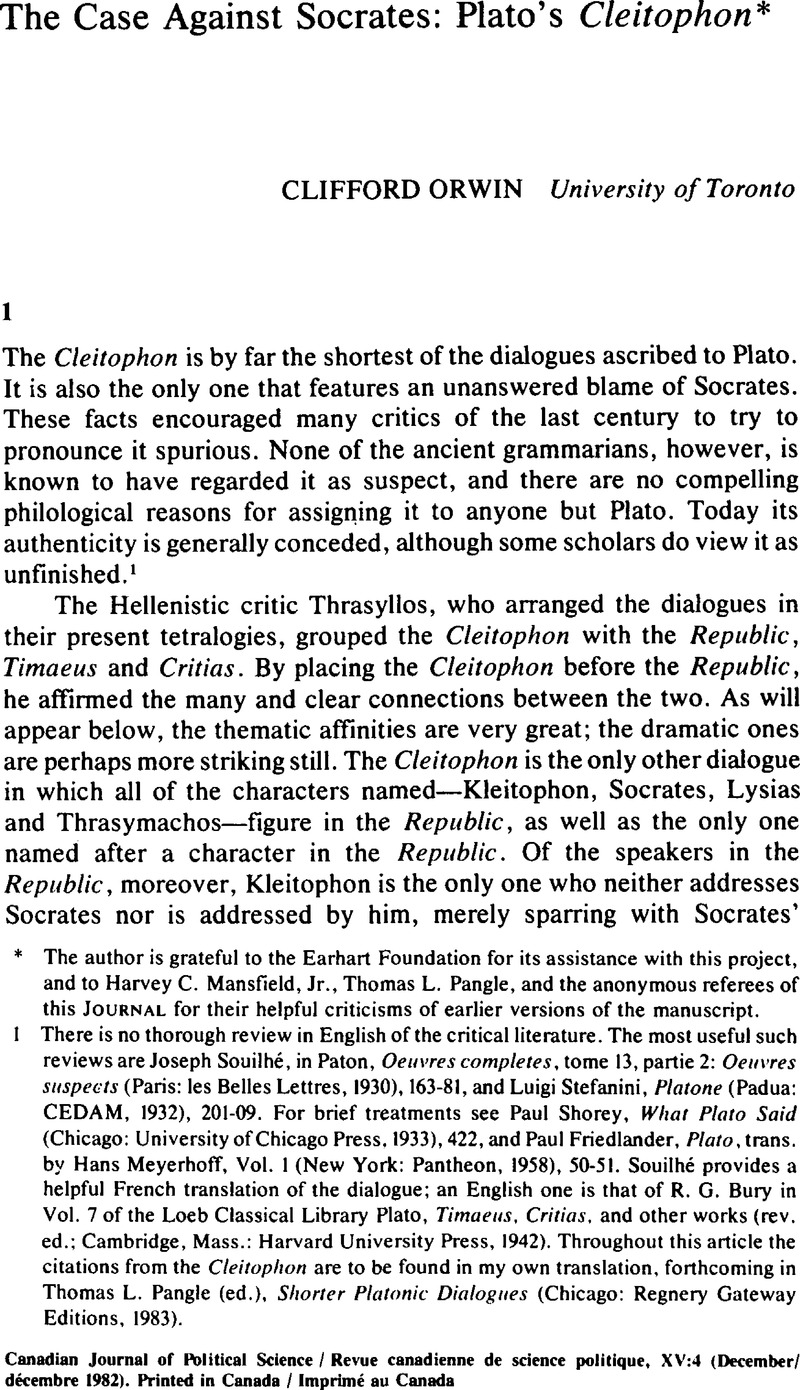Published online by Cambridge University Press: 10 November 2009

1 There is no thorough review in English of the critical literature. The most useful such reviews are Souilhé, Joseph, in Paton, Oeuvres completes, tome 13, partie 2: Oeuvres suspects (Paris: les Belles Lettres, 1930), 163–81Google Scholar, and Stefanini, Luigi, Platone (Padua: CEDAM, 1932), 201–09Google Scholar. For brief treatments see Shorey, Paul, What Plato Said (Chicago: University of Chicago Press. 1933), 422Google Scholar, and Friedlander, Paul, Plato, trans, by Hans Meyerhoff, Vol. 1 (New York: Pantheon, 1958), 50–51Google Scholar. Souilhé provides a helpful French translation of the dialogue; an English one is that of Bury, R. G. in Vol. 7 of the Loeb Classical Library Plato, Timaeus, Critias, and other works (rev. ed.; Cambridge, Mass.: Harvard University Press, 1942).Google Scholar Throughout this article the citations from the Cleitophon are to be found in my own translation, forthcoming in Pangle, Thomas L. (ed.), Shorter Platonic Dialogues (Chicago: Regnery Gateway Editions, 1983).Google Scholar
2 The Republic, compare 450a-b with 498c-d.
3 Ibid., 338e-339b.
4 Citations of the Republic are from the translation of Bloom, Allan (New York: Basic Books, 1968).Google Scholar
5 The Republic, 340a-b. Some would render the first sentence as: “By the advantage of the stronger he meant what the stronger believes to be his advantage.”
6 Compare with Apology of Socrates, 21c-e.
7 The ancient sources are (on Kleitophon) Aristophanes, Frogs 967; Aristotle, Athenian Constitution 29 and 34; (on Theramenes) Thucydides 8.68, 89-94; Aristophanes, Frogs 967-70; Xenophon, Hellenica 1.7; 2.3 and 24-56; Aristotle, Athenian Constitution 28, 32-34, 36-37. A good modern summary is Souilh é , 165-69.There is none in English.
8 Hereafter all textual references are to the Cleitophon unless otherwise noted.
9 Brünnecke, Heinrich, “Kleitophon wider Sokrates,” Archiv für Geschichte der Philosophie 26 (1913), 452-57.Google Scholar
10 Apology, 29d-30c.
12 Compare with the Republic, 357a-367e.
13 Compare with the Republic, 362d-367e.
14 Compare with the Republic, 333e-334b.
15 Compare with the Republic, 332b and following.
16 Compare with the Republic, 335b-e.
17 Compare with the Republic, 474b and following.
18 Compare, for example, the Republic, 435c-d and 437a; Phaedo, 91a-b and 107b; Phaedrus 246a; and Timaeus, 89d-e.
19 “ . . . And if, on the other hand, I say that it even so happens that the greatest good for a human being is this, to talk every day about virtue and the other things about which you hear me conversing and examining myself and others, and that the unexamined life is not worth living for a human being — still less would I persuade you by saying these things. And yet they are so, just as I say, men, although to persuade of them is not easy” (Apology, 38a, italics added; author's translation). The greatest good for a human being is to talk about virtue every day; not, evidently, to practise it as opposed to just talking about it. By the examined life Socrates means a life spent in examining.
20 See Friedlander, Plato, 1, 51, and Stefanini, Platone, 292-95.